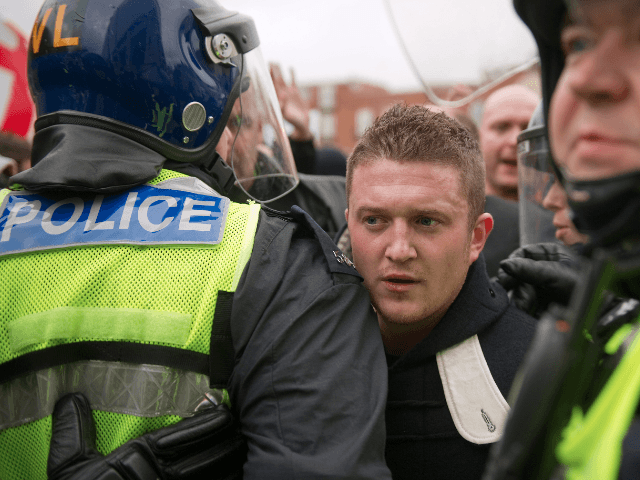Douglas Murry writing for the Gatestone Institute:
- Tommy Robinson has not been — as Choudary was — at the heart of a nexus of terrorists and terrorist-supporters going back years. He has not been on friendly terms with numerous people who have beheaded civilians and carried out suicide bombings.
- Robinson is in an exceptionally unfortunate position. He is not a radical Islamist and nor is he from any discernible minority. He is a white working-class man who, it appears, can thus not only be harassed by certain authorities with impunity, but can find few if any defenders of his rights among the vast panoply of people in our societies who are only too keen to defend the rights of Islamists.
- Civil liberties groups such as “Liberty,” which are so stringent in protecting the rights of Islamist groups such as “Cage,” are silent on the case of Tommy Robinson.
So farewell, then, Anjem Choudary. For two and half years at least. On September 6, the radical cleric was sentenced by a British judge to five and a half years in prison for encouraging people to join the Islamic State. If he behaves himself in prison he could be out in half that time, although whenever he emerges, it is unlikely that it will be as a reformed character. But the law has taken its course and in a rule-bound society has responded in the way that a rule-bound society ought to behave — by the following due process. So it is useful to compare the experience of Anjem Choudary and the way in which the state has responded to him with the way in which it has responded to another person.
It is now seven years ago that a young British man from Luton going by the name of Tommy Robinson formed the English Defence League (EDL). He did so after he and other residents of the town of Luton were appalled by a group of radical Muslims who protested a home-coming parade for British troops. There is some interesting symmetry here in that the Islamists present in Luton that day were members of Anjem Choudary’s group, al-Muhajiroun. Robinson and other residents of Luton were not only taken aback by the behaviour of the radicals but by the behaviour of the police who protected the radicals from the increasingly angry local residents.
Whatever its legitimate grievances when it began, the EDL did undoubtedly cause trouble. Protests often descended into thuggery, partly because of some bad people attracted to it and partly because “anti-fascist” counter-demonstrators often ensured that EDL protests became violent by starting fights with them. But through most of the time that Robinson led the EDL, there did appear to be — confirmed by third-party observers including independent journalists — a sincere and concerted effort to keep genuinely problematic elements out of the organisation. To those who said that Robinson and his friends had no right to organise protests, there are two responses. The first is that they had as much right to be there as anyone else. And second, that the problems they were objecting to (hate-preachers, grooming-gangs and so on) are real issues, which the state has increasingly realised are such in the years that followed.
In 2013 Robinson left the group he started, and in the years since, has engaged in a range of activities, including authoring a book. The book chronicles, among other things, a campaign by the state of harassment, which began from the moment Robinson formed the EDL. His own house and those of his nearest relatives were repeatedly raided by police, and computers and other materials taken away for examination. Any fair reading of the book — whose details have again been broadly confirmed by the few journalists who have been interested in the case — suggests that there was a very clear and concerted effort to find something — anything — on Robinson to get him locked up.
In the end the police did find something — a mortgage fraud matter — for which Robinson was eventually tried and found guilty. In 2014, he was imprisoned for eighteen months. Even after his release, the effort to find something on Robinson continued. His movements were restricted. His ability to speak and congregate was restricted. He was repeatedly threatened with a return to prison for alleged breaches of bail conditions. On one occasion, the nature of the charge was a brawl Robinson had been involved with in prison, with a Muslim prisoner who was allegedly in the act of attacking Robinson — who had repeatedly been placed in prison wings where there were large numbers of Muslim inmates.
Since his release, as before, Robinson has been repeatedly assaulted in the streets, including by Luton Muslims who have faced no subsequent charges for their attacks, even when caught on camera. In February of this year, he was hospitalised after being assaulted upon leaving a nightclub in Essex.
Then, this August, as he and his family were attending a football game in Cambridge, they were once again the subject of police harassment. While sitting in a pub with his wife and young children, they were ejected from the pub by Cambridgeshire police. The police did this despite the volunteered insistence of the management of the pub that the family had been doing nothing wrong and were causing no trouble. Police escorted Robinson and his family from the premises, and on the video footage of the incident you can easily hear the sound of Robinson’s young children crying.
(Read the rest of the article here)

COMMENTS
Please let us know if you're having issues with commenting.